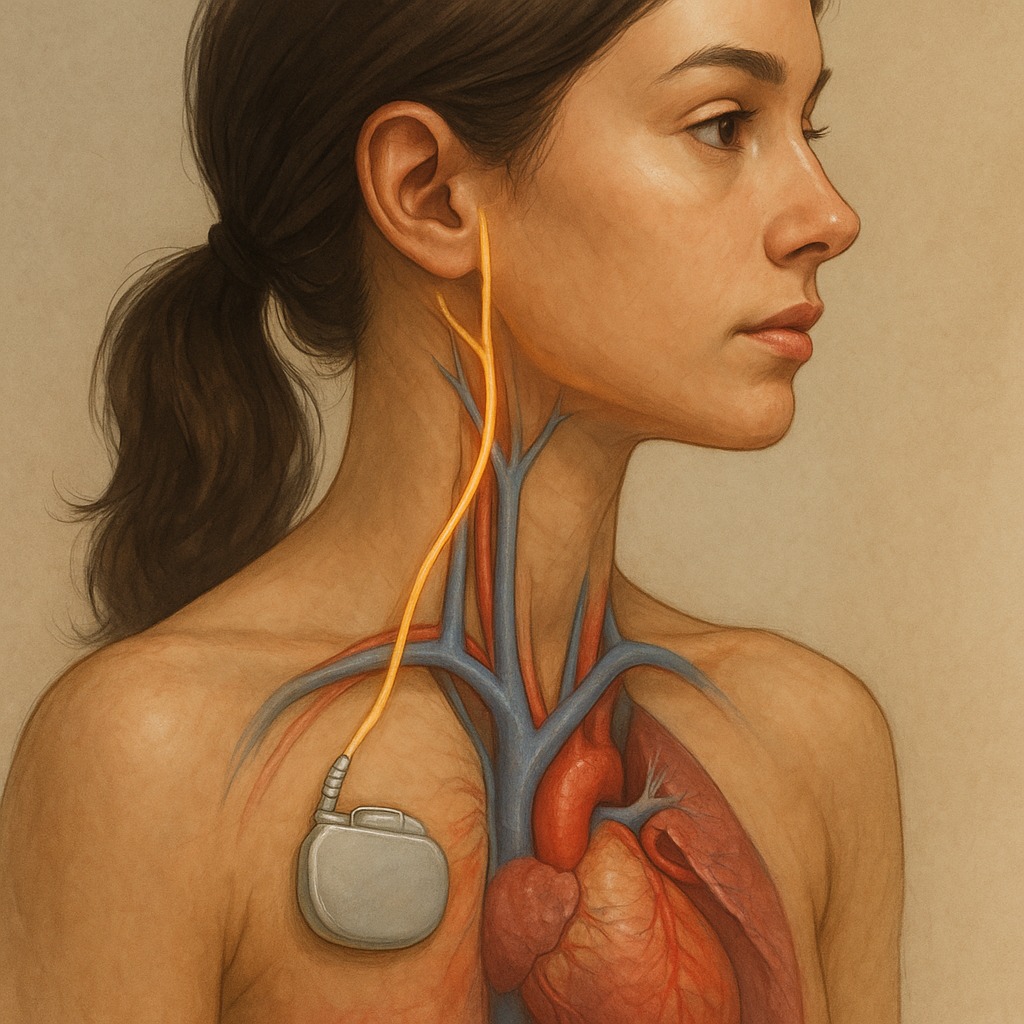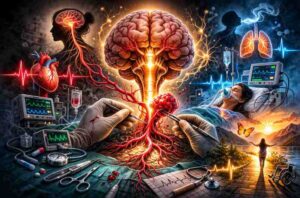Maya, all of 18, had been battling refractory epilepsy for the better part of her adolescence. The word ‘refractory’ always leaves a bitter taste in my mouth as it signifies a resistance to the arsenal of medications we typically rely upon. Maya’s face, although etched with the fatigue of countless seizures, still held the spark of youthful curiosity. Her parents’ faces were a blend of apprehension and desperate hope as they held hands in front of me.
The MRI suggested she wasn’t a candidate for brain surgery. “The only option we have is called vagus nerve stimulation,” I told them. “Think of it this way,” I continued, leaning forward. “The brain is like a city, and seizures are like electrical storms – sudden, uncontrolled bursts of activity. Medications try to dampen these storms, but sometimes, they just aren’t enough.”
“So, what does the vagus nerve do?” Maya asked. “The vagus nerve is fascinating. It’s one of the longest and most important nerves in your body. It’s like a superhighway connecting your brain to almost every major organ below your neck – your heart, lungs, stomach, intestines. It’s a key player in what we call your ‘rest and digest’ system, the opposite of ‘fight or flight. In epilepsy, by gently stimulating this nerve, we’re essentially sending calming signals to your brain, trying to quieten down those electrical storms.”
Her dad looked thoughtful. “So, it’s not directly in the brain?” he asked. “Exactly,” I confirmed. “The device, which is quite small – about the size of a coin – is implanted under the skin in your chest, and a thin wire connects it to the vagus nerve in your neck. It’s like a tiny pacemaker for your brain, delivering regular, mild electrical pulses. By sending these signals, we believe it helps to modulate brain activity, making it less excitable and reducing the likelihood of seizures. It’s not a cure, but for many, it significantly reduces seizure frequency and severity.”
Maya’s eyes lit up with a mischievous glint. “So, if it’s connected to my heart, does that mean it’ll mess with my love life?” I chuckled. “Of course, but for the good,” I confirmed. “It’s the primary brake pedal for your heart, slowing it down when you’re gazing into the eyes of someone special. When you feel those butterflies in your stomach, part of that is your sympathetic nervous system – the ‘fight or flight’ – kicking in. But when you’re feeling calm, content, and perhaps even a little smitten, the vagus nerve is working overtime, keeping that heart rate steady, bringing a sense of warmth and peace.”
“So, no sudden palpitations during a first date, then?” she quipped, still giggling.
“Hopefully not for any medical reason!” I replied, playing along. “But on a serious note, while there can be some mild side effects like a hoarse voice or a cough during stimulation, they are generally well-tolerated and often improve over time.”
After much discussion, Maya and her family decided to go ahead with surgery. The procedure itself involved a few relatively straightforward surgical steps: a small incision in the chest to place the generator and another small incision in the neck to connect the lead to the vagus nerve. Appearing as a pearly white cord, often surrounded by delicate fatty tissue, the vagus nerve is surprisingly slender for such a powerful highway of information. It doesn’t pulsate nor is it vibrant; it lies quietly, almost serenely, a lifeline waiting to be awakened. Seeing it there, so vital yet so unassuming, always reminds me of the hidden depths of connection within us.
The surgery was successful and Maya recovered remarkably quickly. We spent the next few months carefully programming the device, slowly adjusting the stimulation settings. There were small adjustments, minor hiccups, but gradually and remarkably, we started to see a change: her seizures eventually vanished into oblivion.
As they left after her most recent check-up, I felt a familiar sense of purpose, amplified by the joy of a truly happy outcome. It wasn’t just about managing seizures; it was also about making sure her heart was calm enough to feel every beat of joy, and perhaps, even the flutter of a new crush.





22 thoughts on “The tenth nerve”
Given the right advice is the experience of a good Dr .
Sunday CME at home Fun reading learning and thinking yes that nowadays seizures / epileptic attacks find out the cause and treat successfully It gives immense pleasure and a job satisfaction Thanks regards
Your article is always a Super start to a Sunday….very enjoyable, interesting and engaging
Great writing dear Mazda. Enjoyed the same. Thanks for sharing the superb articles 👌👍🙏
Great to know about this 👍
Knowledge knows no bounds.
You’ve just educated me on this Mazda.
Readers of your articles are indeed very fortunate in that they keep adding to their awareness of what goes on in their bodies … and getting entertained in the process!!
Wow! Amazing treatments for refractory diseases , science has so much to offer.
Thanks for sharing .
Enjoyed reading this one! Thanks for sharing 😊
Thank you for sharing.
Desensitize the neuropathic Vagus Nerve could cure many syndromes and intractable diseases.
Excellent work, Professor.
You always find the right words to clearly explain complex pathologies to both patients and specialists. Thank you for generously sharing your experience and wisdom. 👏
Dr Amadou, neurosurgeon from Niger
Dearest Dr Mazda sir …….
In your series of extraordinary Articles this one is really new & lesser known to AAM AADMI particularly your simplest style of explaining vagus nerve & pacemaker substituting surgery…..
BRAVO sir for wonderful piece …..
Although usual Humor is missing improvement of knowledge is great…
A very informative, soothing and hopeful read. Thank you a million for giving such a clear ringside understanding and view into so many neurosurgical challenges. I always.look forward to your writings
God bless you and family. May you live a long and healthy life to carry on the good work you are doing, alleviating patients misery. Firoza and Zinoo Master
Very informative article that such surgery exist to treat seizures.
Thank you for sharing knowledge and excellent work done by you sir 👍👍
Dear doctor ,u have given a new lease of life to a young person. She seems like so much in expectation of good things in her future and u have made it possible for her to have it all.Surely u will be blessed for all ur sincere work in ur treatment of patients of every problem.
This was beautiful — equal parts science, soul and romance.
Though I’ve never heard of the Vagus nerve, you’ve made it sound like a poetic hotline between the brain and the heart.
I hope you’ve not changed your designation from Neurosurgeon to Neuro-romantic 🤨
A complicated surgery that too outside your speciality area, which has cured this young lady, what a super job and diagnosis Dear Mazda. Trye genius
May she find the right guy….💞
Your article are mind bogling but they are pleasing to my heart.
Dear Dr Mazda..a wonderful read as always.
We well understand why an apprehensive patient as well as the anxious family is so reassured in your presence..it is a blessing.
We look fwd to the Sunday mornings now for one more reason.
I was diagnosed with Parkinson’s disease four years ago. For over two years, I relied on Levodopa and several other medications, but unfortunately, the symptoms kept getting worse. The tremors became more noticeable, and my balance and mobility started to decline quickly. Last year, out of desperation and hope, I decided to try a herbal treatment program from NaturePath Herbal Clinic. Honestly, I was skeptical at first, but within a few months of starting the treatment, I began to notice real changes. My movements became smoother, the tremors subsided, and I felt steadier on my feet. Incredibly, I also regained much of my energy and confidence. It’s been a life-changing experience I feel more like myself again, better than I’ve felt in years.If you or a loved one is struggling with Parkinson’s disease, I truly recommend looking into their natural approach. You can visit their website at www .naturepathherbalclinic .com